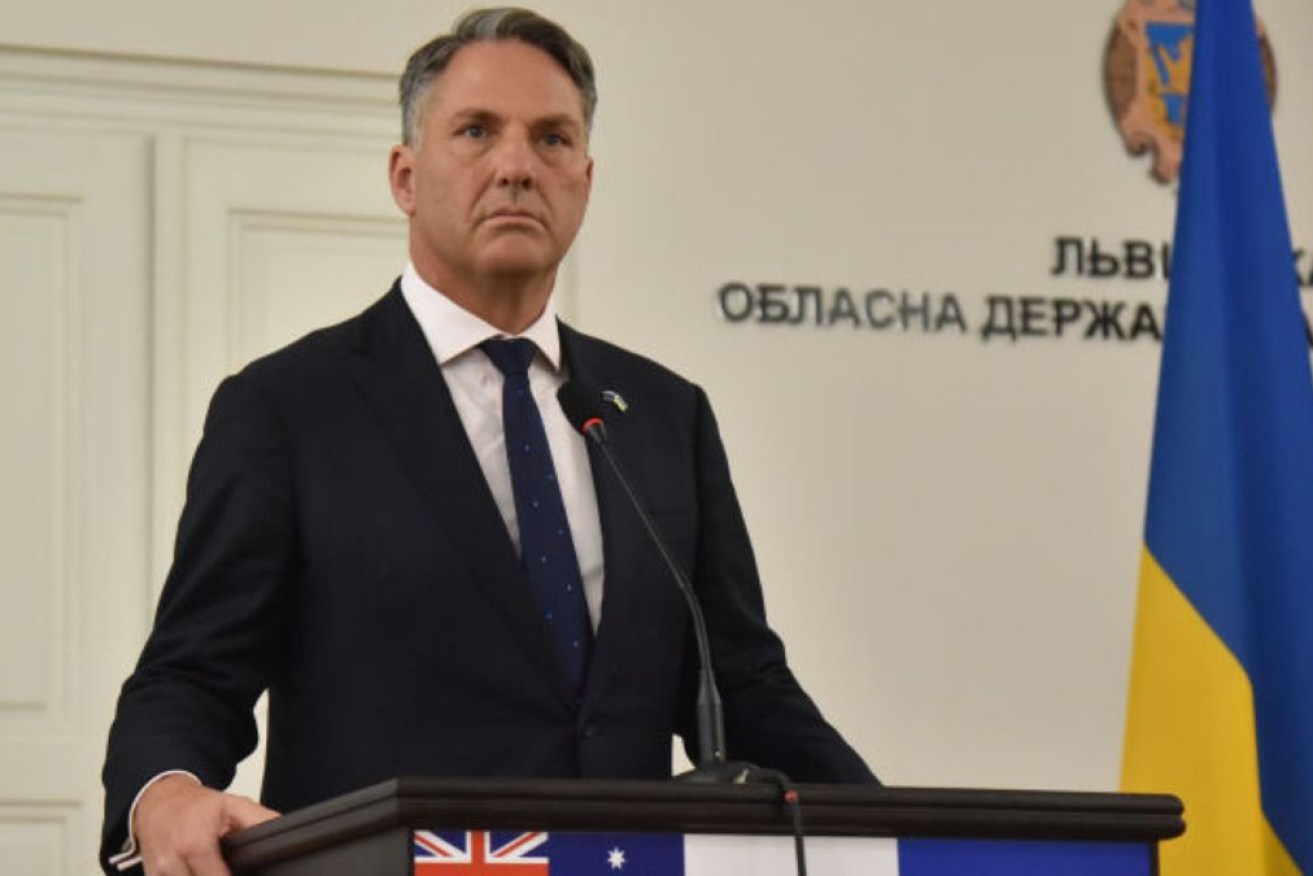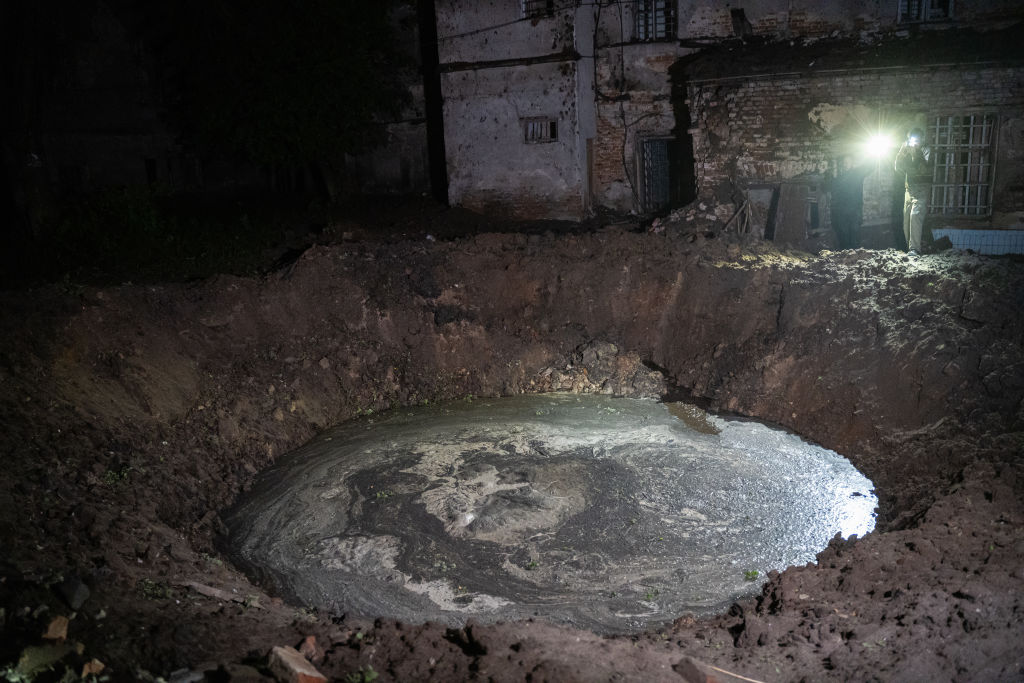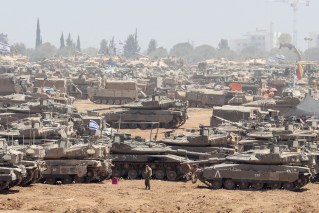Australia flags $100m military boost for Ukraine war

Defence Minister Richard Marles has announced a further $100 million aid package for Ukraine. Photo: Getty
Australia will send unmanned drones, air defence systems and safety equipment to Ukraine as part of a renewed $100 million push to aid the nation in its war against Russia.
The package includes $50 million for short-range air defence systems, $30 million for unmanned drones and $15 million for “high priority” equipment such as combat helmets, inflatable boats, boots, fire masks and generators.
Ukraine will also receive air-to-ground precision munitions.
Deputy Prime Minister Richard Marles announced the package on Saturday during a visit to Ukraine where he met Prime Minister Denys Shmyhal and deputy defence minister Lieutenant General Ivan Havryliuk.
Touring the nation’s defence industry and armed forces base, Marles reaffirmed Australia’s commitment to supporting Ukraine to end the conflict on its terms.
“Ukraine and its people have endured more than two years of Russia’s full-scale invasion but their spirit remains strong,” he said.
The $100 million in military aid brings Australia’s military assistance to Ukraine to $880 million and the nation’s overall support to more than $1 billion.
Australia has previously provided Ukraine with armoured trucks and vehicles including 120 Bushmasters, six boats, de-mining and counter-drone systems and ammunition.
Marles said Australia was committed to supporting Ukraine to resolve the conflict “on its terms”.
“I am pleased to announce an additional $100 million of military assistance, including world leading drone technology, with the support of local Australian defence industry.
“Australia is also providing critical air-to-ground precision munitions and short range air defence systems.
“Australia is proud to be working with our partners, including Poland, to support Ukraine’s self-defence.”
During his overseas trip, Marles also visited Poland where he met his deputy prime minister and defence counterpart Władysław Kosiniak-Kamysz to discuss the conflict in Ukraine and its global implications.
It has been more than two years since Russia launched a full-scale invasion of Ukraine, with the United Nations confirming at least 10,242 civilians killed and more than 19,300 injured.
Power grid pounded
A Russian missile attack has pounded power facilities in the centre and west of Ukraine, mounting pressure on the ailing energy system as the country faces a shortage of air defences despite a breakthrough in US military aid.
The strike on Saturday (local time) using ballistic missiles and cruise missiles fired by Russian strategic bombers based in the Arctic Circle was the fourth large-scale aerial assault targeting the power system since March 22.
“The enemy again massively shelled Ukrainian energy facilities,” said DTEK, the largest private electricity company, adding that four of its six thermal power plants had suffered new damage overnight.
Rescuers battled to put out massive fires at several energy facilities in the western regions of Lviv and Ivano-Frankivsk, which border NATO members Poland and Romania, officials said.

A crater left by an explosion in Kharkiv, near a psychiatric hospital. Photo: Getty
In President Volodymyr Zelensky’s hometown of Kryvyi Rih, the supply of running water was disrupted after strikes on energy facilities in the central Dnipropetrovsk region, officials said.
“Unfortunately, we could not avoid the consequences,” Governor Serhiy Lysak said.
“Energy facilities in Dnipropetrovsk and Kryvyi Rih regions were damaged — fires broke out.”
Ukrainian air defences were able to bring down 21 of the 34 incoming missiles, the commander of the air force said in a statement.
None of the hit facilities were identified by name — part of what authorities say is an essential security measure to prevent Russia from quickly assessing the impact of its strikes.
Russia denies targeting civilians during its air attacks but says the Ukrainian energy system is a legitimate military target.
In the northeast city of Kharkiv, which has been heavily bombed in recent weeks, a missile struck a hospital holding 60 patients, injuring a woman and damaging the building, nearby water pipes and power lines, the governor said.
Ukraine, which has tried to take the fight back to Russia in recent months using long-range drones, attacked the Ilsky and Slavyansk oil refineries in Russia’s Krasnodar region overnight, a Ukrainian intelligence source told Reuters.
The drone strike conducted by the SBU security service caused fires at the facilities, the source said.
Ukrainian drones also attacked Russia’s Kushchevsk military airfield in the same southern region, the source said.
The Slavyansk oil refinery was forced to suspend some operations after being damaged in the attack, Russian state news agency TASS cited an executive overseeing the plant as saying.

Celebrating the 768th anniversary of the city of Lviv. Photo: Getty
Ukraine has lost 80 per cent of its thermal power generation and 35 per cent of its hydro-electric capacity during Russian attacks, officials say.
Though the core of the energy system comes from nuclear power, that lost capacity serves a balancing function in the grid and its loss could be a big problem when consumption rises later this year, officials say.
Rolling blackouts have been introduced in several regions, but the full impact of the attacks has not been felt because consumption, which is at its highest in winter and the peak of summer, is at a seasonal low due to the mild weather.
There were no planned blackouts for now in Lviv region, some 900km from the eastern front, but the governor urged residents to economise on electricity use.
“It’s difficult for the energy system to maintain the production and consumption balance,” he said.
Maxim Timchenko, CEO of DTEK, said: “Last night’s attacks underline the continued urgent need for Ukraine’s allies to provide stronger air defence systems.”
The US approved a major aid package for Ukraine this week, overcoming a deadlock in Congress that dragged on for six months while Kyiv’s weapon stocks became depleted.
On Friday, the Pentagon announced it would buy $US6 billion ($A9.2 billion) worth of weapons for Ukraine including interceptors for the Patriot air defence system.








